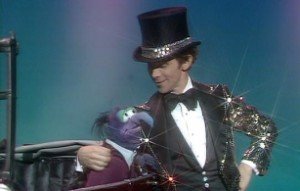The Muppet Show 1.03: “Joel Grey”
The third installment of The Muppet Show (currently available on DVD) features a lot of firsts. For starters, it’s the first episode of the show to have been filmed during the show’s regular production schedule, beginning in May 1976. The Juliet Prowse and Connie Stevens episodes were shot as test episodes in January of that year in advance of the show starting in earnest. It’s also the first episode where the guest is a man–star of stage and screen Joel Grey–which incidentally also marks the first time Kermit doesn’t flirt with the celebrity! In fact, it’s the exact opposite. If anything, Kermit gets a bit testy with him, and the feeling is mutual, albeit both in a comedic way.
During their sitdown chat, Kermit has trouble allowing Joel to have a word in edgewise. He starts talking about the fact that Joel grew up in an a showbiz family and that his first stage role was at 10 years old, and listing where he was born, where he lives now, the names of his children (one of whom, Jennifer, would later become famous in her own right as Baby from Dirty Dancing!), what pets he has, and so on and so forth, Joel getting increasingly frustrated throughout. Finally, Kermit asks him to tell him a little about himself. “Actually, there’s not much left to tell,” an exhausted Joel responds, and Kermit follows up by staring into the camera, saying, “Boy…what a dull guest!” Which is a nifty way of telling the audience right away that this isn’t like a typical variety show. The guests aren’t coming on to be fawned over or to simply plug themselves. A Muppet Show guest has to be willing to laugh at themselves and allow themselves to surrender to some truly bizarre situations.
It’s also a nice counterpoint to the…shall we say slightly hyperbolic way that Kermit first introduces him. While otherwise a brilliant emcee, Kermit had an odd tendency, particularly in the first season, to overhype his guests…oh, just a tad. Here, he does so by basically describing Disney’s Fantasia, asking us if we’d like to see “4,000 woodpeckers performing an aerial ballet while 87 gorillas and two dozen elephants do The Dance of the Sugar Plum Fairy,” and then promptly telling us to “Forget it! Instead we have Joel Grey, which is like having all the excitement of everything I mentioned without having to clean up afterwards.” Now, absolutely no offense intended to Mr. Grey whatsoever, particularly as I’m a huge fan of his, but even he would probably admit that that’s all a bit much. I know Kermit can be overly excitable but sheesh, who could live up to that?
Grey does give it the old college try, however, leading two of the three big production numbers in the episode, all of which are Broadway showstoppers, clearly as a tribute to Grey, who won a Tony for creating the role of the eerie Emcee in the original Broadway production of Cabaret and then an Oscar for recreating the role on film. Which leads us to another first: Grey performs “Willkommen,” the opening number from Cabaret here, the first time a singer on The Muppet Show performed one of the songs for which they were famous. This actually remains a relative rarity, as people would tend to request that they be allowed to do things with the Muppets that they weren’t known for, seeing it as an opportunity to really have fun and break free from public perception of them. But, at this early stage, the show seems to not have fully decided how much to avoid variety show cliches and how much to embrace them.
At least this is one of the most unusual renditions of “Willkommen” Grey had likely ever performed. Now, I do have to admit, I always find this number a little strange here, and it’s completely due to the original context of the song. For those who don’t know, Cabaret is an extremely dark musical set in a hedonistic nightclub in Berlin, shortly before the Nazi party came to power and destroyed one of the most liberal, artistic places in the world at that point. The cabaret is a place where people are encouraged to give into their deepest, darkest desires, sexual and otherwise, while the threat of Hitler and all of the evils he wrought upon the world are ever-looming in the background, drawing ever closer. And so you might see why it feels strange to behold a completely lighthearted version of the song set in a nightclub populated with Muppets, cracking jokes and singing along.
Despite that, it’s actually a great scene. Grey’s terrific and light on his feet, with excellent back-and-forth chemistry with the Muppets (including Dr. Teeth, Janice, Zoot, Wayne and Wanda, Mildred, Gonzo, and Green Frackle). In the original show, when the Emcee tells us that “even the orchestra is beautiful,” we discover that the orchestra is full of sexy dancing women. Here, the “beautiful orchestra” is made up of Muppy, Catgut from Muppet Musicians of Bremen, and Baskerville! And his introduction of the dancers is even funnier, as they’re two lady pigs, so he amends his “beautiful” description to “if your standards aren’t too high”! Luckily, Miss Piggy is not one of them or he wouldn’t have survived that line.
The best part, however, is when he gets to the part where he’s supposed to say “I am your host,” but Kermit coopts the line instead, with Joel responding, “I am your guest!”–a nice little passing of the torch, so to speak, from one famous emcee to the other. But, again, as much as I always love Muppets singing showtunes, and as fun as this one is, it still feels a bit uncomfortable to me, not only because of the Nazi Germany connections but because it takes a song that is complex, dark, and meaningful in its original show and reduces it to its surface entertainment aspects. There are a number of brilliant cases in which Jim Henson found complex additional nuances to classic songs, weaving new layers of humor, pathos, and/or melancholy into them through the Muppet versions. This is not one of those cases. But it’s still fun.
Joel is also part of the episode’s big finale, which occurs as a result of Gonzo needing cheering up after yet another of his performance art pieces fails to capture the heart and soul of the audience. This time around, his idea is to demolish an antique automobile with a mallet to the tune of the “Anvil Chorus,” but the boos demoralize him so much that he considers giving up show business all together, not unlike Fozzie in the last episode. “Yokels! Rubes!” he yells. “What do you know about great art?!”
That’s when Joel Grey comes out and offers some sage advice to Gonzo, that perhaps all his act needs is a little pizzazz, immediately segueing into a rendition of “Razzle Dazzle,” which, like “Willkommen” before it, is also from a musical by composing duo Kander and Ebb (likely chosen due to that link), but this time around, that show is Chicago, and while this rendition of the song might be similarly lacking in the darker edge of the musical it’s from–in which it’s used to demonstrate how a criminal defense attorney can distract from his client’s guilt through snazzy subterfuge and showmanship–it fits better here, perhaps because the sequins, magic tricks, and kaleidoscopic special effects on display are closer to the song’s original intent rather than “Willkommen,” which had to be drastically desexualized to work with the Muppets.
While discussing the Juliet Prowse episode, I brought up something that is relevant here as well, which is that the show was sometimes ambiguous about what was happening “according to the script” and what was happening “on the fly,” not in the sense of the literal Muppet Show script but rather the TV show’s internal reality that the Muppets are putting on a vaudeville show that they’ve presumably planned and rehearsed to some degree. And so here, if we are meant to take the reality of the scenario literally, then Joel Grey and all the Muppets who join him in the song have to have improvised this final number, because it springs out of Grey trying to help a distraught Gonzo.



